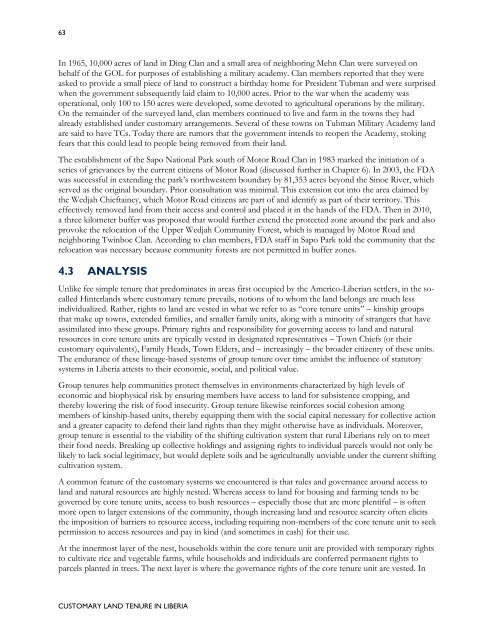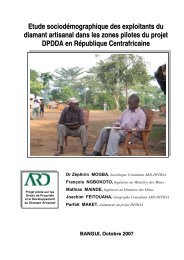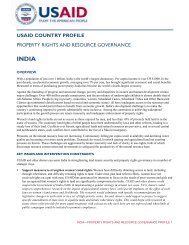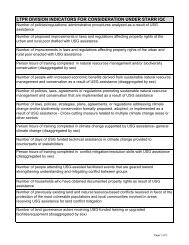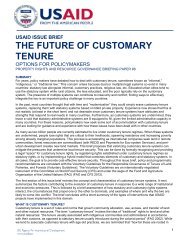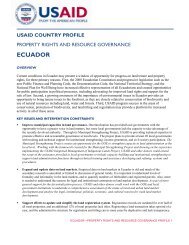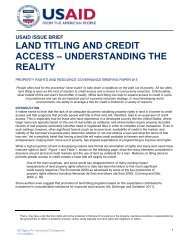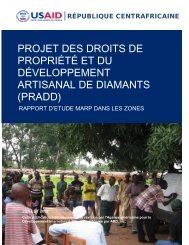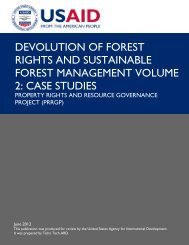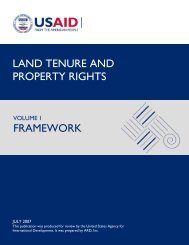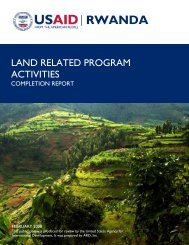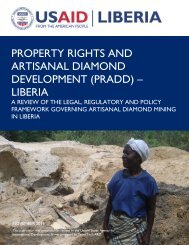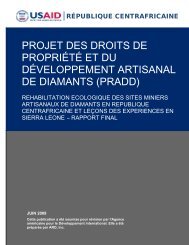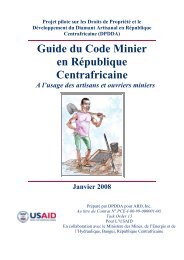Customary Land Tenure in Liberia - Land Tenure and Property ...
Customary Land Tenure in Liberia - Land Tenure and Property ...
Customary Land Tenure in Liberia - Land Tenure and Property ...
Create successful ePaper yourself
Turn your PDF publications into a flip-book with our unique Google optimized e-Paper software.
63<br />
In 1965, 10,000 acres of l<strong>and</strong> <strong>in</strong> D<strong>in</strong>g Clan <strong>and</strong> a small area of neighbor<strong>in</strong>g Mehn Clan were surveyed on<br />
behalf of the GOL for purposes of establish<strong>in</strong>g a military academy. Clan members reported that they were<br />
asked to provide a small piece of l<strong>and</strong> to construct a birthday home for President Tubman <strong>and</strong> were surprised<br />
when the government subsequently laid claim to 10,000 acres. Prior to the war when the academy was<br />
operational, only 100 to 150 acres were developed, some devoted to agricultural operations by the military.<br />
On the rema<strong>in</strong>der of the surveyed l<strong>and</strong>, clan members cont<strong>in</strong>ued to live <strong>and</strong> farm <strong>in</strong> the towns they had<br />
already established under customary arrangements. Several of these towns on Tubman Military Academy l<strong>and</strong><br />
are said to have TCs. Today there are rumors that the government <strong>in</strong>tends to reopen the Academy, stok<strong>in</strong>g<br />
fears that this could lead to people be<strong>in</strong>g removed from their l<strong>and</strong>.<br />
The establishment of the Sapo National Park south of Motor Road Clan <strong>in</strong> 1983 marked the <strong>in</strong>itiation of a<br />
series of grievances by the current citizens of Motor Road (discussed further <strong>in</strong> Chapter 6). In 2003, the FDA<br />
was successful <strong>in</strong> extend<strong>in</strong>g the park‟s northwestern boundary by 81,353 acres beyond the S<strong>in</strong>oe River, which<br />
served as the orig<strong>in</strong>al boundary. Prior consultation was m<strong>in</strong>imal. This extension cut <strong>in</strong>to the area claimed by<br />
the Wedjah Chiefta<strong>in</strong>cy, which Motor Road citizens are part of <strong>and</strong> identify as part of their territory. This<br />
effectively removed l<strong>and</strong> from their access <strong>and</strong> control <strong>and</strong> placed it <strong>in</strong> the h<strong>and</strong>s of the FDA. Then <strong>in</strong> 2010,<br />
a three kilometer buffer was proposed that would further extend the protected zone around the park <strong>and</strong> also<br />
provoke the relocation of the Upper Wedjah Community Forest, which is managed by Motor Road <strong>and</strong><br />
neighbor<strong>in</strong>g Tw<strong>in</strong>boe Clan. Accord<strong>in</strong>g to clan members, FDA staff <strong>in</strong> Sapo Park told the community that the<br />
relocation was necessary because community forests are not permitted <strong>in</strong> buffer zones.<br />
4.3 ANALYSIS<br />
Unlike fee simple tenure that predom<strong>in</strong>ates <strong>in</strong> areas first occupied by the Americo-<strong>Liberia</strong>n settlers, <strong>in</strong> the socalled<br />
H<strong>in</strong>terl<strong>and</strong>s where customary tenure prevails, notions of to whom the l<strong>and</strong> belongs are much less<br />
<strong>in</strong>dividualized. Rather, rights to l<strong>and</strong> are vested <strong>in</strong> what we refer to as “core tenure units” – k<strong>in</strong>ship groups<br />
that make up towns, extended families, <strong>and</strong> smaller family units, along with a m<strong>in</strong>ority of strangers that have<br />
assimilated <strong>in</strong>to these groups. Primary rights <strong>and</strong> responsibility for govern<strong>in</strong>g access to l<strong>and</strong> <strong>and</strong> natural<br />
resources <strong>in</strong> core tenure units are typically vested <strong>in</strong> designated representatives – Town Chiefs (or their<br />
customary equivalents), Family Heads, Town Elders, <strong>and</strong> – <strong>in</strong>creas<strong>in</strong>gly – the broader citizenry of these units.<br />
The endurance of these l<strong>in</strong>eage-based systems of group tenure over time amidst the <strong>in</strong>fluence of statutory<br />
systems <strong>in</strong> <strong>Liberia</strong> attests to their economic, social, <strong>and</strong> political value.<br />
Group tenures help communities protect themselves <strong>in</strong> environments characterized by high levels of<br />
economic <strong>and</strong> biophysical risk by ensur<strong>in</strong>g members have access to l<strong>and</strong> for subsistence cropp<strong>in</strong>g, <strong>and</strong><br />
thereby lower<strong>in</strong>g the risk of food <strong>in</strong>security. Group tenure likewise re<strong>in</strong>forces social cohesion among<br />
members of k<strong>in</strong>ship-based units, thereby equipp<strong>in</strong>g them with the social capital necessary for collective action<br />
<strong>and</strong> a greater capacity to defend their l<strong>and</strong> rights than they might otherwise have as <strong>in</strong>dividuals. Moreover,<br />
group tenure is essential to the viability of the shift<strong>in</strong>g cultivation system that rural <strong>Liberia</strong>ns rely on to meet<br />
their food needs. Break<strong>in</strong>g up collective hold<strong>in</strong>gs <strong>and</strong> assign<strong>in</strong>g rights to <strong>in</strong>dividual parcels would not only be<br />
likely to lack social legitimacy, but would deplete soils <strong>and</strong> be agriculturally unviable under the current shift<strong>in</strong>g<br />
cultivation system.<br />
A common feature of the customary systems we encountered is that rules <strong>and</strong> governance around access to<br />
l<strong>and</strong> <strong>and</strong> natural resources are highly nested. Whereas access to l<strong>and</strong> for hous<strong>in</strong>g <strong>and</strong> farm<strong>in</strong>g tends to be<br />
governed by core tenure units, access to bush resources – especially those that are more plentiful – is often<br />
more open to larger extensions of the community, though <strong>in</strong>creas<strong>in</strong>g l<strong>and</strong> <strong>and</strong> resource scarcity often elicits<br />
the imposition of barriers to resource access, <strong>in</strong>clud<strong>in</strong>g requir<strong>in</strong>g non-members of the core tenure unit to seek<br />
permission to access resources <strong>and</strong> pay <strong>in</strong> k<strong>in</strong>d (<strong>and</strong> sometimes <strong>in</strong> cash) for their use.<br />
At the <strong>in</strong>nermost layer of the nest, households with<strong>in</strong> the core tenure unit are provided with temporary rights<br />
to cultivate rice <strong>and</strong> vegetable farms, while households <strong>and</strong> <strong>in</strong>dividuals are conferred permanent rights to<br />
parcels planted <strong>in</strong> trees. The next layer is where the governance rights of the core tenure unit are vested. In<br />
CUSTOMARY LAND TENURE IN LIBERIA


